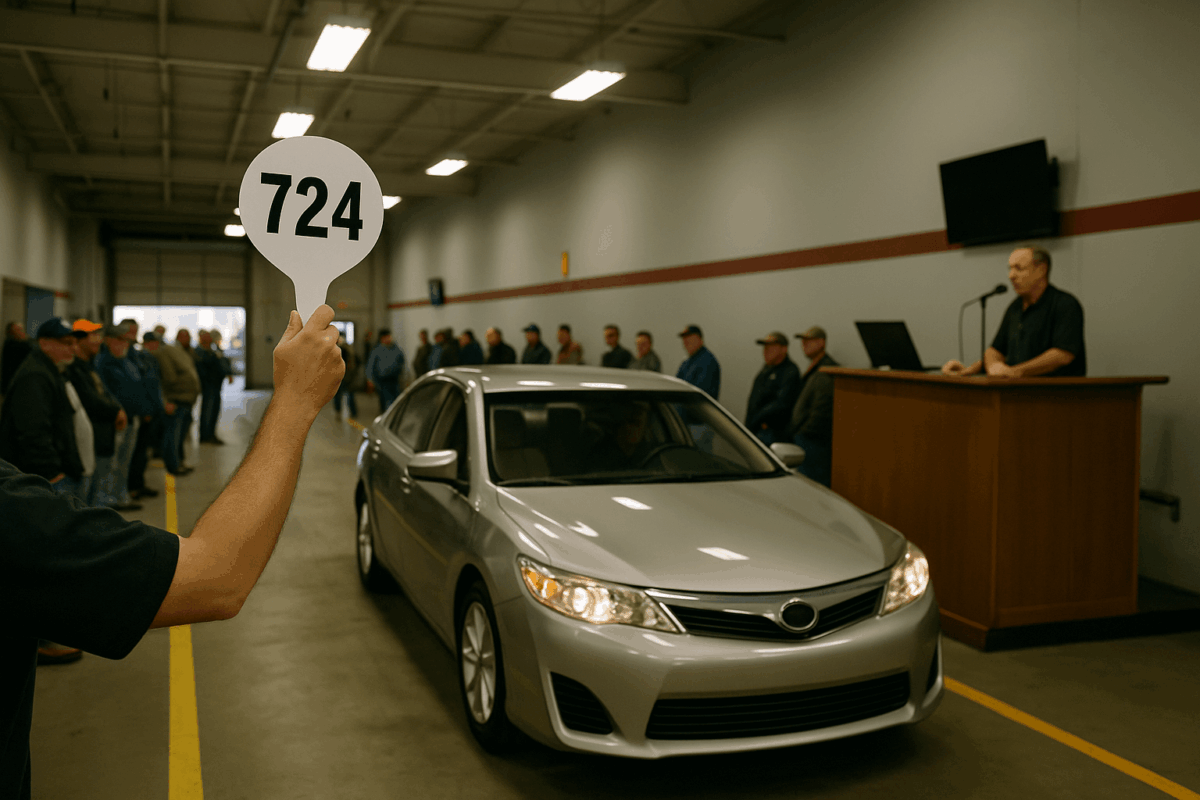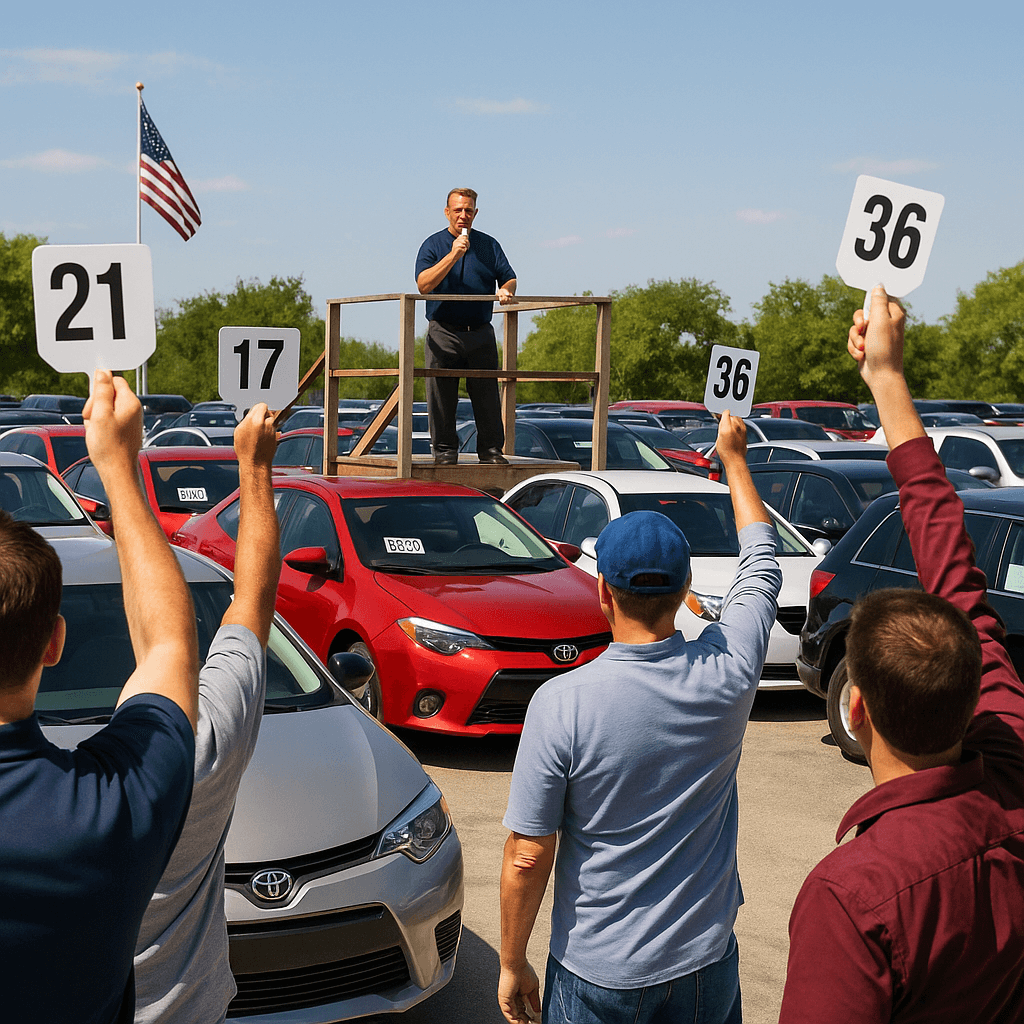In cities filled with hustle and limited space, like New York, fast vehicle turnover is a necessity. That’s one reason car auctions in NYC thrive. But why do cars go to auction in the first place? Why do cars go to auction at such scale, especially in cities? Whether you’re a buyer looking for a good deal or a seller seeking efficiency, this guide breaks down the logic behind the auction block.
Common Reasons Cars Are Sent to Auction
- Dealer Surplus Inventory: New car dealerships rotate stock quickly. If cars sit unsold for months, they go to auction to make room for new inventory.
- Lease Returns: Many cars go to auction at the end of lease agreements. These vehicles are often gently used, with verified service history.
- Repossessions: Financial institutions repossess cars after loan defaults. These are sold quickly to recover losses.
- Fleet Vehicles: Rental car companies and government agencies regularly auction off cars to refresh their fleets.
- Salvage or Damaged Cars: After accidents, insurance firms declare vehicles totaled and push them to salvage auctions.
Each category shows how dealers, banks, and insurance firms use auctions to cut costs and avoid delays. These vehicles sold at auction may be older models or nearly new—but the motivation is always the same: reduce losses and move car inventory fast.
Types of Auto Auctions Explained
| Auction Type | Access Level | Vehicle Source | Typical Buyer |
| Dealer Auctions | Licensed car dealers only | Car dealerships, trade ins | Used car dealers |
| Public Auctions | Open to all | Fleet vehicles, repos | Individual buyers |
| Online Auctions | Mixed (public + dealer) | Diverse group | Prospective buyers |
| Specialty Auctions | Closed auctions | Classic, salvage, rare cars | Collectors, niche dealers |
Understanding these differences helps buyers navigate the auction process with clarity. Many cars go to auction through multiple channels, including private auctions, government auctions, and online auctions. Cars go to auction for numerous reasons, but buyers must assess which auction type suits their goals.
Who Sends Cars to Auction – and Why?

- Car Dealerships: To sell cars that don’t move off the lot. Auctions provide speed.
- Banks and Financial Institutions: After repossession, cars go to auction to recoup loan balances.
- Fleet Operators: Rental car companies and delivery services cycle out older models.
- Insurance Companies: Vehicles sold after claims, especially salvage title automobiles.
Their goals? Liquidate used car inventory, avoid costly repairs, reduce storage, and maintain clean ledgers. For some dealerships, it’s also a way to offload trade ins or vehicles with low demand. Used vehicle surpluses often result from seasonal drops or missed sales targets—dealer auctions offer a quick exit.
Pros and Cons of Buying a Car at Auction
Pros
- Lower final price compared to dealerships
- Wide selection of used cars and pre owned cars
- Fast purchase timeline
- Great for buyers seeking a dream car at below-market price
- Some auto auctions list newer vehicles still under factory warranty
Cons
- No test drives or full inspections
- Many vehicles sold “as-is”
- Auction fees and buyer’s premiums can raise total cost
- Closed auctions may require registration and fees
While some auction cars are good cars, others require repairs. Proceed cautiously. Auctions provide excellent value, but only when buyers act with strategy. Many buyers enter hoping to save money, only to realize inspection limits pose risks.
Step-by-Step: How to Participate in a Car Auction

- Pre-register: Sign up online or in person.
- Load Deposit: Submit funds to qualify for bidding.
- Preview Listings: Use filters to examine upcoming sales.
- Inspect Vehicles: Attend preview days or request condition reports.
- Set Your Budget: Know your maximum bid.
- Bid Smart: Use online tools or bid live.
- Win & Pay: Settle payment immediately.
- Arrange Transport: Pick up or schedule shipping.
The auction process moves quickly—timing and prep matter. Buyers aiming to purchase cars for resale must act fast and remain within budget. Most auctions favor buyers who arrive with financing and logistics ready.
Key Risks to Watch Out for When Bidding
- Hidden Damage: Many cars go to auction with issues that only surface post-sale.
- Title Problems: Salvage or rebuilt titles can complicate registration.
- Unexpected Fees: Buyer’s premiums, storage charges, or transport costs can inflate the final price.
- Emotional Bidding: Overpaying chases the dream car, not value.
Use VIN checks to avoid costly surprises. Auctions move at speed, and most auctions do not allow time for reflection. Proceed cautiously to avoid expensive mistakes. Always ask if the seller is a private seller or a business—this affects documentation.
Unique Insights: Why Urban Auctions Matter
In crowded metros, car inventory moves fast. Government auctions offload fleet vehicles quickly. Dealerships in high-rent zones use auctions to refresh offerings instead of storing old cars.
Local geography drives higher volume and diversity. That’s why most auctions in NYC feature many cars in all conditions—from nearly new to retired fleet vehicles. Car auctions in NYC help city dealerships keep new inventory rotating efficiently. Geographic location shapes auction volume, pricing, and inventory types.
What Happens After the Gavel Falls? Post-Auction Process
- Payment Due: Immediately after the sale
- Paperwork: Title transfer, bill of sale, buyer ID
- Logistics: Pick up in 48–72 hours or pay storage
- Issues: If salvage, rebuild inspection required
Buying from auto auctions is quick but comes with strict post-sale steps. Many buyers overlook storage deadlines or title delays. Individual sales through closed auctions may include extra forms and delays.
Auctions vs Dealerships: Which Should You Choose?
| Feature | Auction | Dealership |
| Price | Often lower | Higher, includes warranty |
| Inspection | Limited or unavailable | Full PPI available |
| Inventory | Varies, fast turnover | Stable, curated |
| Sale Type | As-is, no return | Negotiable, some returns |
| Buyer Experience | Fast, high-pressure | Slower, more personal |
Used car buyers seeking value look to auctions. Others prefer the safety of car dealerships. Depending on market trends, car prices at auction may be significantly more competitive. Buyers hunting for older models or individual vehicles often start with public auctions.
FAQ Section
Why are so many used cars sold at auction?
Auctions help car dealers and financial institutions sell inventory fast and with fewer admin hurdles.
Can anyone go to a car auction?
Only public auctions are open to all; dealer auctions require licenses.
Are auction cars always damaged or low quality?
No. Many cars are lease returns or fleet units in decent condition.
Is it safe to buy a car at auction?
Yes, if you do your homework: inspect vehicles, check VINs, and know your limits.
How do I find out the history of a car at auction?
Use a VIN decoding service or get a full report if the VIN is provided.
Can I return a car after buying it at auction?
Most auctions are final sales. Always check policies before bidding.
What if I win a bid by mistake?
You risk losing your deposit or being banned. Read the terms carefully.
What’s the average fee added to auction car purchases?
Expect 5–10% buyer’s premium, plus optional services like transport.

